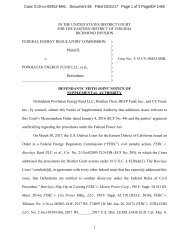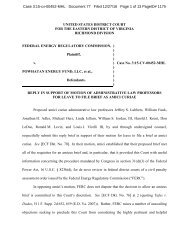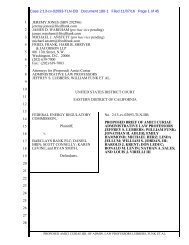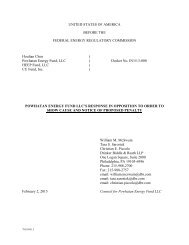FERC-Response-03-24-17
FERC-Response-03-24-17
FERC-Response-03-24-17
Create successful ePaper yourself
Turn your PDF publications into a flip-book with our unique Google optimized e-Paper software.
Case 3:15-cv-00452-MHL Document 84 Filed <strong>03</strong>/<strong>24</strong>/<strong>17</strong> Page 14 of 30 PageID# 1433<br />
remedies.”) (“Towns of Norwood”) (citations omitted); see also, Pub. Util. Dist. No. 1 of<br />
Snohomish Cty. v. Dynegy Power Mktg., Inc., 384 F.3d 756, 762 (9th Cir. 2004) (manipulative<br />
market practices are “reserved exclusively to <strong>FERC</strong>, both to enforce and to remedy”) (citations<br />
omitted).<br />
B. The Commission’s “primary expertise” is relevant here.<br />
The primary jurisdiction doctrine, which promotes fairness and efficiency by allowing<br />
courts to defer matters pending action by expert agencies see Cent. Tel. Co. of Va. v. Sprint<br />
Commns., Inc., 759 F .Supp. 2d 772, 786 (E.D. Va. 2011) (describing the doctrine), does not<br />
directly arise in this case because Congress has already clearly established by statute that the<br />
Commission must act before the Court does. But the prudential purpose of the doctrine is a<br />
compelling reason to interpret the language of the statute to allow for court review, as opposed to<br />
trial, of the Commission's order – namely, that Congress wanted an initial agency assessment<br />
utilizing the agency’s expertise and fostering a uniformity of interpretation. See id., and Ricci v.<br />
Chicago Mercantile Exch., 409 U.S. 289, 305-306 (1973) (explaining application of primary<br />
jurisdiction in context of Commodity Futures Trading Commission).<br />
The Commission’s expertise is clearly implicated here. As noted above, courts have<br />
recognized the importance of that expertise in discharging the Commission’s central<br />
responsibility under the FPA: ensuring abundant, reliable supplies of electric energy and<br />
ensuring that the rates at which that energy is sold at wholesale are just, reasonable, and not<br />
unduly preferential or discriminatory. That expertise is needed equally whether it involves the<br />
Commission’s review and approval of cost-based rates and terms and conditions of service, or<br />
the setting of rates by market forces in Commission-approved regional wholesale energy<br />
markets. Hughes v. Talen Energy Marketing, LLC, 136 S. Ct. 1288, 1292 (2016). The core<br />
9






